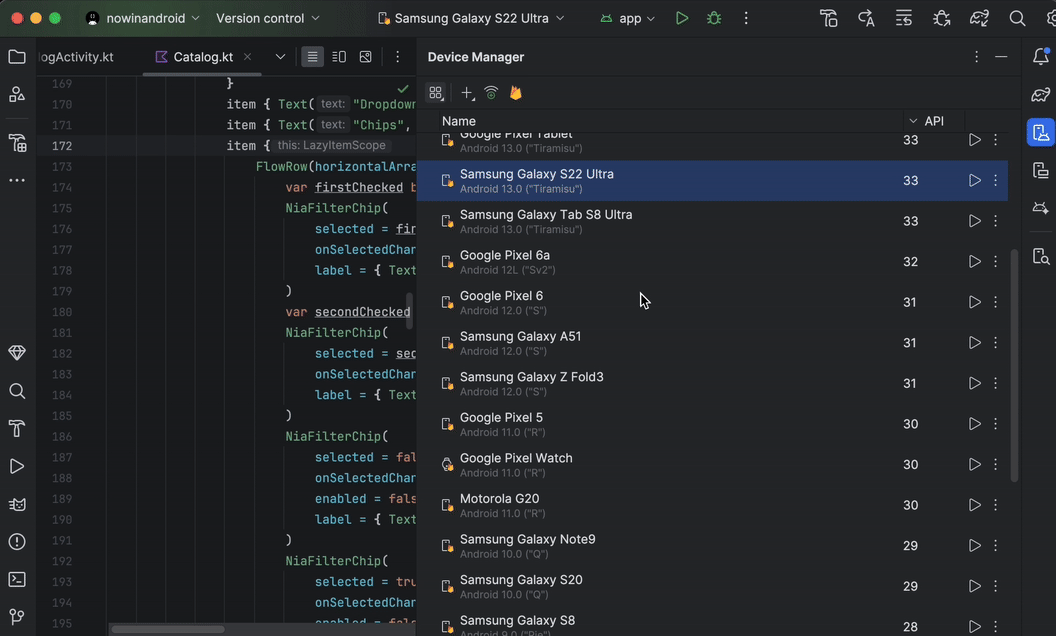Posted by Adarsh Fernando, Senior Product Manager, Android Developer Tools
Validating your app on a range of Android screens is an important step to developing a high quality Android app. However, getting access to the device you need, when you need it, can be challenging and time consuming. From trying to reproduce a device specific behavior on a Samsung device to testing your adaptive app layouts on the Google Pixel Fold, having the right device at the right time is critical.
To address this app developer use case, we created Android Device Streaming, powered by Firebase. With just a few clicks, you and your team can access real physical devices, such as the latest Pixel and Samsung devices, and use them in the IDE in many of the ways you would use a physical device sitting on your desk.

Today, Android Device Streaming is in beta and is available to all Android developers using Android Studio Jellyfish or later. We’ve also added new devices to the catalog and introduced flexible pricing that provides low-cost access to the latest Android devices.
Read below to learn what changes are in this release, as well as common questions around uses, security, and pricing. However, if you want to get started right away and try Android Device Streaming at no cost, see our getting started guide.
What can you do with Android Device Streaming?
If you’ve ever used Device Mirroring, you know that Android Studio lets you see the screen of your local physical device within the IDE window. Without having to physically reach out to your device, you’re able to change the device orientation, change the posture of foldables, simulate pressing physical buttons, interact with your app, and more. Android Device Streaming leverages these same capabilities, allowing you to connect and interact with remote physical devices provided by Firebase.

When you use Android Studio to request a device from Android Device Streaming, the IDE establishes a secure ADB over SSL connection to the device. The connection also lets you use familiar tools in Android Studio that communicate with the device, such as the Debugger, Profiler, Device Explorer, Logcat, Compose Live Edit, and more. These tools let you more accurately validate, test, and debug the behavior of your app on real OEM hardware.
What devices would my team have access to?
Android Device Streaming gives you and your team access to a number of devices running Android versions 8.1 through 14. You have access to the latest flagship devices from top device manufacturers, such as Google Pixel and Samsung. You can expand testing your app across more form factors with access to the latest foldables and tablets, such as the Samsung Tab S8 Ultra.

And we’re frequently adding new devices to our existing catalog of 20+ device models, such as the following recent additions:
- Samsung Galaxy Z Fold5
- Samsung Galaxy S23 Ultra
- Google Pixel 8a
Without having to purchase expensive devices, each team member can access Firebase’s catalog of devices in just a few clicks, for as long as they need—giving your team confidence that your app looks great across a variety of popular devices.

As we mentioned at Google I/O ‘24, we’re partnering with top Original Equipment Manufacturers (OEMs), such as Samsung, Google Pixel, Oppo, and Xiaomi, to expand device selection and availability even further in the months to come. This helps the catalog of devices grow and stay ahead of ecosystem trends, so that you can validate that your apps work great on the latest devices before they reach the majority of your users.
Is Android Device Streaming secure?
Android Device Streaming, powered by Firebase, takes the security and privacy of your device sessions very seriously. Firebase devices are hosted in secure global data centers and Android Studio uses an SSL connection to connect to the device.
A device that you’ve used to install and test your app on is never shared with another user or Google service before being completely erased and factory reset. When you’re done using a device, you can do this yourself by clicking “Return and Erase Device” to fully erase and factory reset it. The same applies if the session expires and the device is returned automatically.

How much does Android Device Streaming cost?
Depending on your Firebase project’s pricing plan, Android Device Streaming users can use Android Device Streaming with the following pricing:
- On June 1, 2024, for a promotional period:
- (no cost) Spark plan: 120 no cost minutes per project, per month
- Blaze plan: 120 no cost minutes per project, per month, 15 cents for each additional minute
- On or around February, 2025, the promotional period will end and billing will be based on the following quota limits:
- (no cost) Spark plan: 30 no cost minutes per project, per month
- Blaze plan: 30 no cost minutes per project, per month, 15 cents for each additional minute
With no monthly or yearly contracts, Android Device Streaming’s per-minute billing provides unparalleled flexibility for you and your team. And importantly, you don’t pay for any period of time required to set up the device before you connect, or erase the device after you end your session. This allows you and your team to save time and costs compared to purchasing and managing your own device lab.
To learn more, see Usage levels, quotas, and pricing.
What’s next
We’re really excited for you and your team to try Android Device Streaming, powered by Firebase. We think it’s an easy and cost-effective way for you to access the devices you need, when you need them, and right from your IDE, so that you can ensure the best quality and functionality of your app for your users.
The best part is, you can try out this new service in just a few clicks and at no cost. And our economical per-minute pricing provides increased flexibility for your team to go beyond the monthly quota, so that you only pay for the time you’re actively connected to a device—no subscriptions or long-term commitments required.
You can expect that the service will be adding more devices from top OEM partners to the catalog, to ensure that device selection remains up-to-date and becomes increasingly diverse. Try Android Device Streaming today and share your experience with the Android developer committee on LinkedIn, Medium, YouTube, or X.





